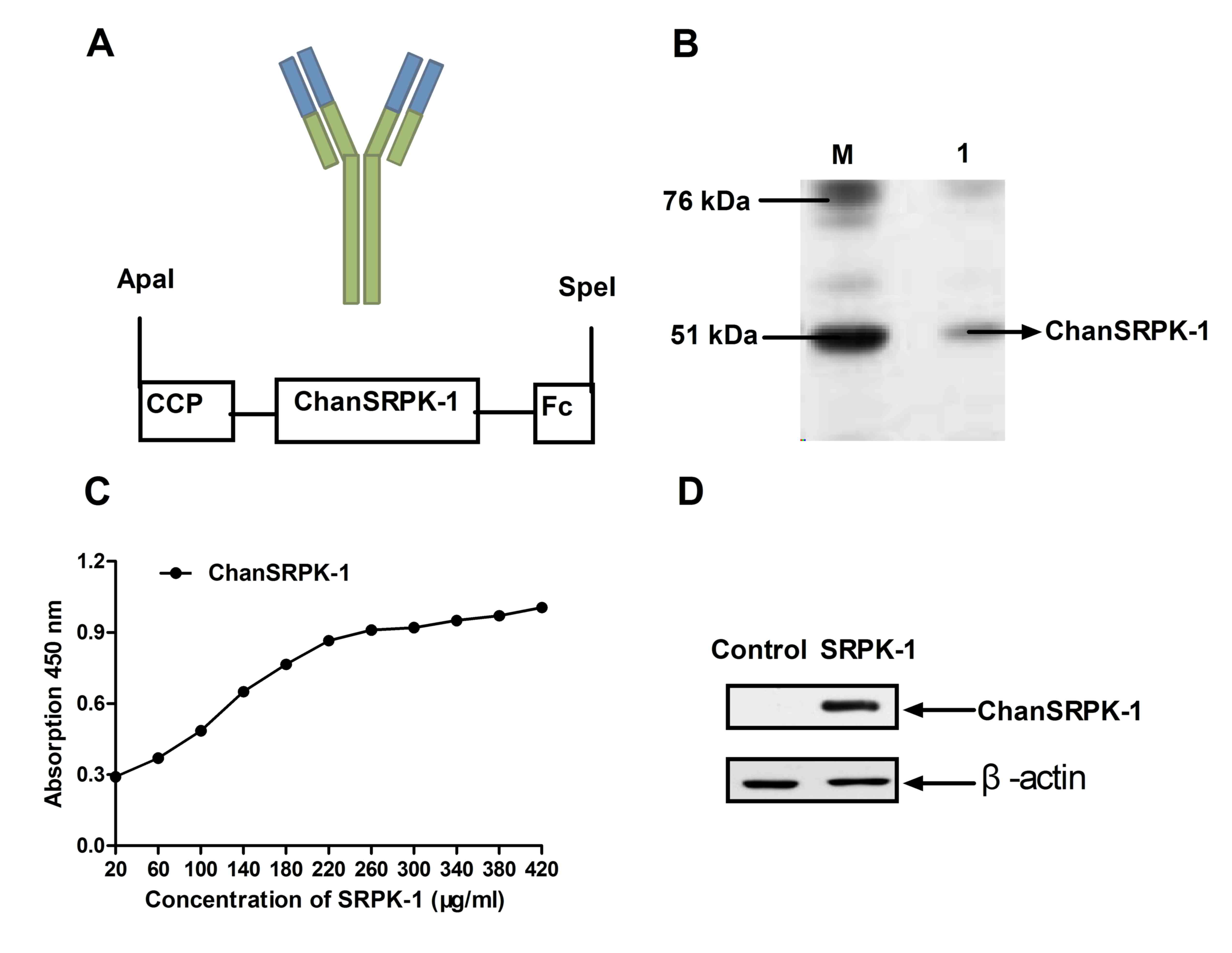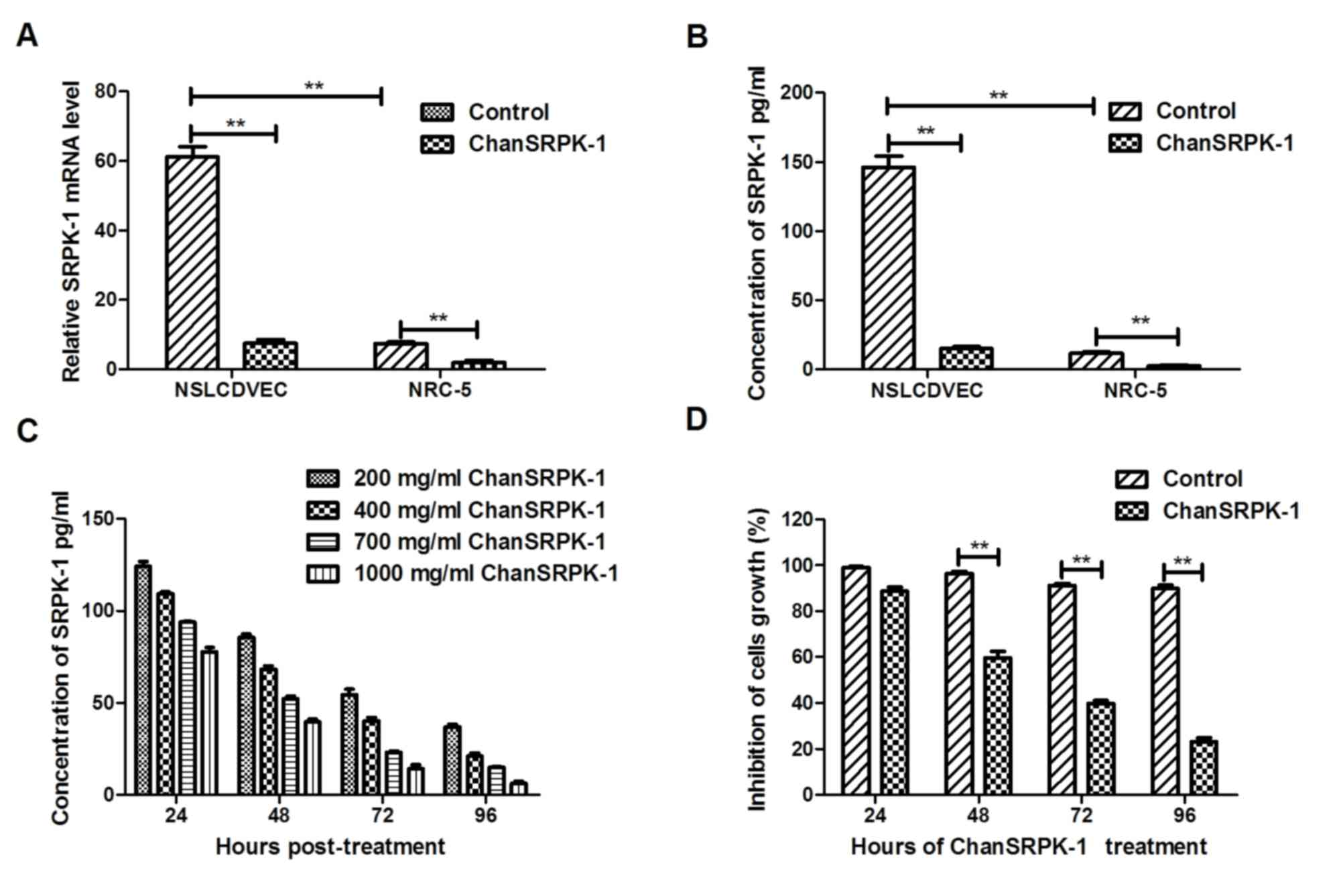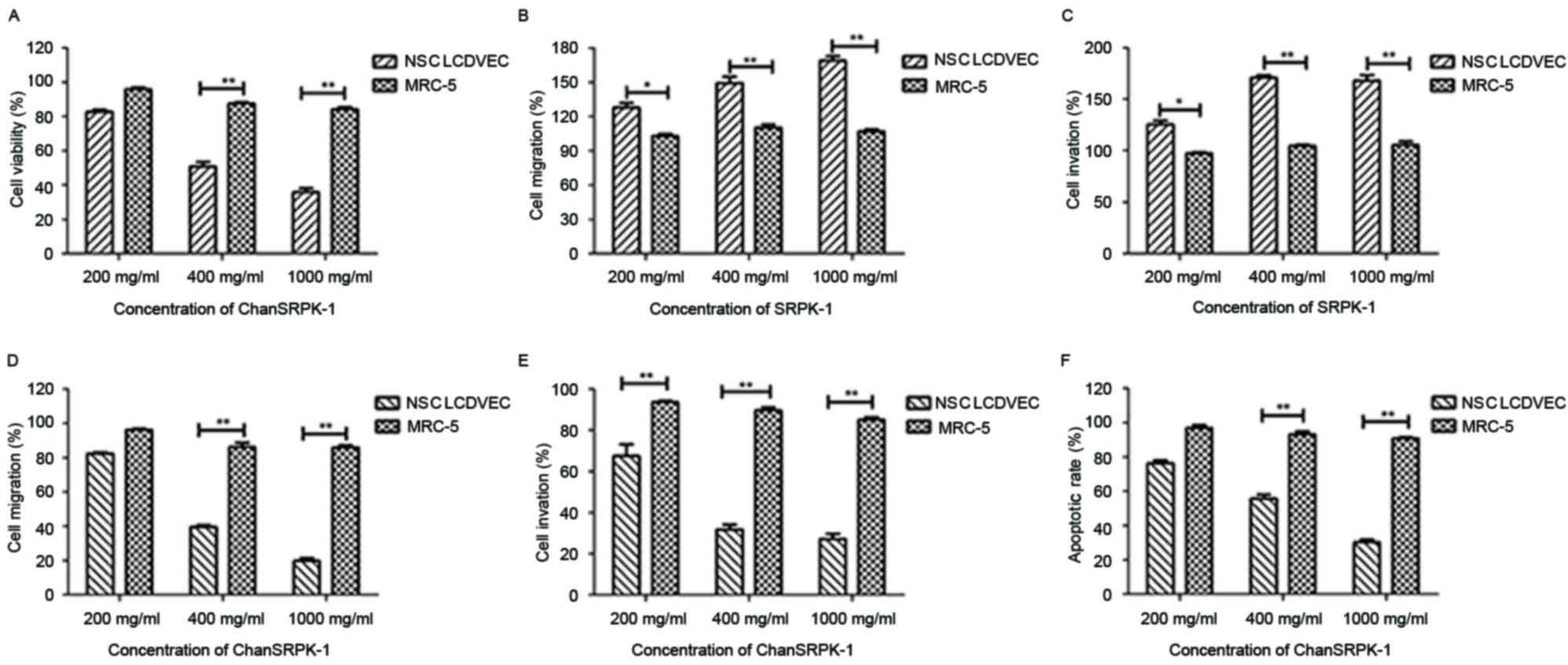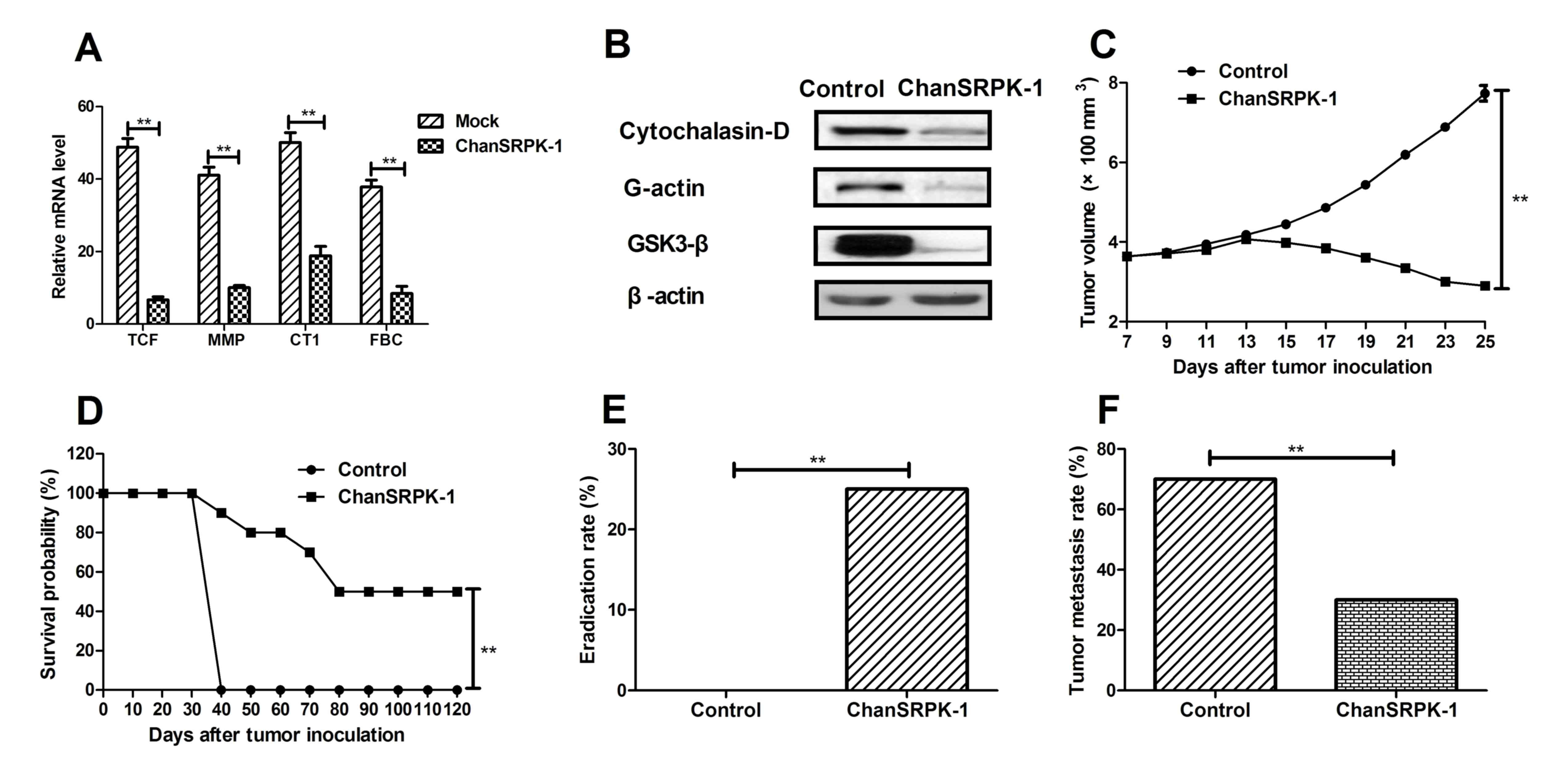|
1
|
Blair HA and Deeks ED: Albumin-bound
paclitaxel: A review in non-small cell lung cancer. Drugs.
75:2017–2024. 2015. View Article : Google Scholar : PubMed/NCBI
|
|
2
|
DeCotiis C, Hu Y, Greenberg AK, Huie M,
Tsay JC, Pass H, Goldberg JD and Rom WN: Inflammatory cytokines and
non-small cell lung cancer in a CT-scan screening cohort:
Background review of the literature. Cancer Biomark. 16:219–233.
2016. View Article : Google Scholar : PubMed/NCBI
|
|
3
|
Keating GM: Nivolumab: A review in
advanced squamous non-small cell lung cancer. Drugs. 75:1925–1934.
2015. View Article : Google Scholar : PubMed/NCBI
|
|
4
|
van der Wekken AJ, Saber A, Hiltermann TJ,
Kok K, van den Berg A and Groen HJ: Resistance mechanisms after
tyrosine kinase inhibitors afatinib and crizotinib in non-small
cell lung cancer, a review of the literature. Crit Rev Oncol
Hematol. 100:107–116. 2016. View Article : Google Scholar : PubMed/NCBI
|
|
5
|
Brody H: Lung cancer. Nature. 513
Suppl:S12014. View
Article : Google Scholar : PubMed/NCBI
|
|
6
|
Moro-Sibilot D, Smit E, de Castro Carpeño
J, Lesniewski-Kmak K, Aerts JG, Villatoro R, Kraaij K, Nacerddine
K, Dyachkova Y, Smith KT, et al: Non-small cell lung cancer
patients with brain metastases treated with first-line
platinum-doublet chemotherapy: Analysis from the European FRAME
study. Lung Cancer. 90:427–432. 2015. View Article : Google Scholar : PubMed/NCBI
|
|
7
|
Barnett SA, Downey RJ, Zheng J, Plourde G,
Shen R, Chaft J, Akhurst T, Park BJ and Rusch VW: Utility of
routine PET imaging to predict response and survival after
induction therapy for non-small cell lung cancer. Ann Thorac Sur.
101:1052–1059. 2016. View Article : Google Scholar
|
|
8
|
Xie FJ, Lu HY, Zheng QQ, Qin J, Gao Y,
Zhang YP, Hu X and Mao WM: The clinical pathological
characteristics and prognosis of FGFR1 gene amplification in
non-small-cell lung cancer: A meta-analysis. OncoTargets Ther.
9:171–181. 2016. View Article : Google Scholar
|
|
9
|
Lim SH, Sun JM, Lee SH, Ahn JS, Park K and
Ahn MJ: Pembrolizumab for the treatment of non-small cell lung
cancer. Expert Opin Biol Ther. 16:397–406. 2016. View Article : Google Scholar : PubMed/NCBI
|
|
10
|
Müller B, Bovet M, Yin Y, Stichel D, Malz
M, González-Vallinas M, Middleton A, Ehemann V, Schmitt J, Muley T,
et al: Concomitant expression of far upstream element (FUSE)
binding protein (FBP) interacting repressor (FIR) and its splice
variants induce migration and invasion of non-small cell lung
cancer (NSCLC) cells. J Pathol. 237:390–401. 2015. View Article : Google Scholar : PubMed/NCBI
|
|
11
|
Zhao Q, Yue J, Zhang C, Gu X, Chen H and
Xu L: Inactivation of M2 AChR/NF-κB signaling axis reverses
epithelial-mesenchymal transition (EMT) and suppresses migration
and invasion in non-small cell lung cancer (NSCLC). Oncotarget.
6:29335–29346. 2015.PubMed/NCBI
|
|
12
|
Lehman M: Improving therapeutic outcomes
in non-small cell lung cancer not suitable for curative intent
therapy- A review of the role of radiation therapy in an era of
increasing systemic therapy options. Clin Oncol (R Coll Radiol).
28:327–333. 2016. View Article : Google Scholar : PubMed/NCBI
|
|
13
|
Polo V, Zago G, Frega S, Canova F, Bonanno
L, Favaretto A, Bonaldi L, Bertorelle R, Conte P and Pasello G:
Non-small cell lung cancer in a very young woman: A case report and
critical review of the literature. Am J Case Rep. 16:782–789. 2015.
View Article : Google Scholar : PubMed/NCBI
|
|
14
|
Li XH, Song JW, Liu JL, Wu S, Wang LS,
Gong LY and Lin X: Serine-arginine protein kinase 1 is associated
with breast cancer progression and poor patient survival. Med
Oncol. 31:832014. View Article : Google Scholar : PubMed/NCBI
|
|
15
|
Liu H, Hu X, Zhu Y, Jiang G and Chen S:
Up-regulation of SRPK1 in non-small cell lung cancer promotes the
growth and migration of cancer cells. Tumour Biol. 37:7287–7293.
2016. View Article : Google Scholar : PubMed/NCBI
|
|
16
|
Krishnakumar S, Mohan A, Kandalam M,
Ramkumar HL, Venkatesan N and Das RR: SRPK1: A cisplatin sensitive
protein expressed in retinoblastoma. Pediatr Blood Cancer.
50:402–406. 2008. View Article : Google Scholar : PubMed/NCBI
|
|
17
|
Mavrou A, Brakspear K, Hamdollah-Zadeh M,
Damodaran G, Babaei-Jadidi R, Oxley J, Gillatt DA, Ladomery MR,
Harper SJ, Bates DO and Oltean S: Serine-arginine protein kinase 1
(SRPK1) inhibition as a potential novel targeted therapeutic
strategy in prostate cancer. Oncogene. 34:4311–4319. 2015.
View Article : Google Scholar : PubMed/NCBI
|
|
18
|
Hayes GM, Carrigan PE and Miller LJ:
Serine-arginine protein kinase 1 overexpression is associated with
tumorigenic imbalance in mitogen-activated protein kinase pathways
in breast, colonic, and pancreatic carcinomas. Cancer Res.
67:2072–2080. 2007. View Article : Google Scholar : PubMed/NCBI
|
|
19
|
Nishio M, Horai T, Horiike A, Nokihara H,
Yamamoto N, Takahashi T, Murakami H, Yamamoto N, Koizumi F, Nishio
K, et al: Phase 1 study of lenvatinib combined with carboplatin and
paclitaxel in patients with non-small-cell lung cancer. Br J
Cancer. 109:538–544. 2013. View Article : Google Scholar : PubMed/NCBI
|
|
20
|
Sultani M, Azad T Mokhtari, Eshragian M,
Shadab A, Naseri M, Eilami O and Yavarian J: Multiplex SYBR green
real-time PCR assay for detection of respiratory viruses.
Jundishapur J Microbiol. 8:e190412015. View Article : Google Scholar : PubMed/NCBI
|
|
21
|
Han S, Bui NT, Ho MT, Kim YM, Cho M and
Shin DB: Dexamethasone inhibits TGF-β1-induced cell migration by
regulating the ERK and AKT pathways in human colon cancer cells via
CYR61. Cancer Res Treat. 48:1141–1153. 2016. View Article : Google Scholar : PubMed/NCBI
|
|
22
|
Fenton-Ambrose L and Kazerooni EA:
Preventative care: Lung-cancer screens now worth the cost. Nature.
514:352014. View
Article : Google Scholar : PubMed/NCBI
|
|
23
|
Kim DS, Park KM, Won YS, Kim JY, Lee JK,
Kim JG, Oh ST, Jung SS and Kang WK: Occurrence and prognosis of
symptomatic venous thromboembolism in colorectal cancer surgery
patients. Vasc Specialist Int. 30:49–55. 2014. View Article : Google Scholar : PubMed/NCBI
|
|
24
|
Tauhardt E, Reissig A, Winkens T and
Freesmeyer M: Early detection of disease progression after
palliative chemotherapy in NSCLC patients by (18)F-FDG-PET.
Nuklearmedizin. 53:197–204. 2014. View Article : Google Scholar : PubMed/NCBI
|
|
25
|
Gold M, Dunn LB, Phoenix B, Paul SM,
Hamolsky D, Levine JD and Miaskowski C: Co-occurrence of anxiety
and depressive symptoms following breast cancer surgery and its
impact on quality of life. Eur J Oncol Nurs. 20:97–105. 2016.
View Article : Google Scholar : PubMed/NCBI
|
|
26
|
Huang W, Chang HY, Fei T, Wu H and Chen
YG: GSK3 beta mediates suppression of cyclin D2 expression by tumor
suppressor PTEN. Oncogene. 26:2471–2482. 2007. View Article : Google Scholar : PubMed/NCBI
|
|
27
|
Yoon C, Kim D, Kim S, Park GB, Hur DY,
Yang JW, Park SG and Kim YS: MiR-9 regulates the
post-transcriptional level of VEGF165a by targeting SRPK-1 in
ARPE-19 cells. Graefes Arch Clin Exp Ophthalmol. 252:1369–1376.
2014. View Article : Google Scholar : PubMed/NCBI
|


















